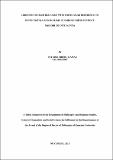Christian-Muslim Dialogue with Particular Reference to Pentecostals and Muslims in Nairobi North District, Nairobi County, Kenya

View/
Date
2013-11Author
Kamau, Patrick Mburu
Type
ThesisLanguage
enMetadata
Show full item recordAbstract
Interfaith dialogue is indispensable to peace and tranquility globally within the context of religious pluralism. Christians and Muslims worldwide stand in need of greater intercommunication, collaboration, and interfaith dialogue for harmonious living. Leaders of these faiths concur that Christian-Muslim dialogue is imperative. However, the interaction between Pentecostal Christians and Muslims has generally been characterized by distrust, apprehension and mutual rivalry, sometimes resulting into loss of life and destruction of property. In Nairobi, features of mistrust, disharmony, and intolerance among Pentecostal churches toward Muslims have been witnessed. The study explored Christian-Muslim dialogue with particular reference to Pentecostal Christians and Muslims in Nairobi North District, Kenya. It examines Biblical and Qur‘anic teaching on Christian-Muslim dialogue as well as the role of religious organizations in fostering such dialogue. The study was guided by the Integrated Inclusivism Conceptual Model of dialogue which underlines areas of convergence and divergence in order to promote constructive Christian-Muslim dialogue. Overall, the study sought to examine how Christian-Muslim dialogue becomes a practical model for both Pentecostal Christians and Muslims in Nairobi building a harmonious human community that respects each other‘s differences and particularities. Data for this study was gathered from both primary and secondary sources. Field research involved self-administered questionnaires and oral interviews. A non-probability sample method was used to collect data. The study purposively selected respondents from Pentecostal churches and mosques in Nairobi North District as well as the religious organizations that focus on interfaith dialogue based in Nairobi. Key respondents, focus group discussions and secondary data were utilized. Qualitative data, which reflect crosscutting issues, is thematized and grouped into similar categories for analysis. The study used SPSS in data analysis.Quantitative data is analyzed using descriptive statistics (simple statistical techniques) and these frequencies and percentages discussed and presented using tables and figures. The two categories of data are synthesized, integrated and presented thematically according to the objectives of the study. The research findings underscore that a constructive Christian-Muslim dialogueshould take into consideration integrated inclusivism ideals associated with shared theological concepts and values, socio-political and economic dialogue and divergent theological concept. The study found five main recommendation areas which when applied would promote constructiveinterfaith dialogue between Pentecostal Christians and Muslims in Nairobi North District. These include;promoting Christian-Muslim dialogue through Biblical and Qur‘anicteachings, historical perspective, overcoming interfaith hindrances, through religious organizations, religious and political leaders and integrated inclusivism ways. In conclusion, interfaith dialogue is the solutions for effectivedialogue between Muslims and Pentecostal Christians in Nairobi North District.
URI
https://www.semanticscholar.org/paper/Christian-Muslim-Dialogue-with-Particular-Reference-Kamau/ff89de5a63ee98b7af2d212ee0b3db3917d33aachttps://ir-library.ku.ac.ke/handle/123456789/8974?show=full
http://hdl.handle.net/123456789/513
Publisher
Kenyatta University
Subject
Christian-Muslim dialogueChristocentrism
Divergent theological matters
Integrated inclusivism conceptual model
Interfaith dialogue
Religious equality
Muslim umma
Pentecostal Christians
personal relationships
Religio-political interests
shura
socio-economic
socio-political and economic dialogue
socioreligious love
Theological or reader presupposition
